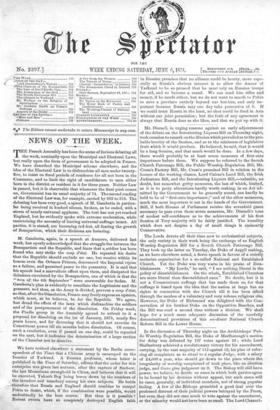The Lords devote all their time now to ecclesiastical subjects,
the only variety in their work being the exchange of an English Worship Regulation Bill for a Scotch Church Patronage Bill. They took up the latter on Tuesday, the Duke of Argyll making, as we have elsewhere noted, a fierce speech in favour of a strictly sectarian organisation for a so-called National and Established Church. Yet the Duke was very warm in his praise of Esta- blishments. " My Lords," he said, " I see nothing liberal in the policy of disestablishment. On the whole, Established Churches are more liberal than disestablished ones." No doubt, but it is not a Communicant suffrage that has made them so, for that suffrage is based upon the idea that the nation at large has no rights in connection with the Church till it has been sifted through the meshes of a voluntary and very 'solemn, religious rite. However, the Duke of Richmond was delighted with the Con- servatism of his brother Duke on the Opposition Benches, and the Bill was read a second time without a division. We shall hope for a much more adequate discussion of the carefully denominational provisions of this soi-disant National Church Reform Bill in the Lower House.


































